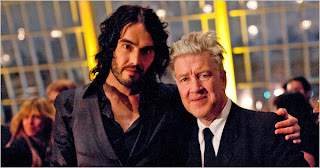Today’s post, Look Who’s Meditating Now, is brought to you courtesy of the New York Times.
POSTER BOY Russell Brand with David Lynch at the December Met fundraiser for Mr. Lynch’s foundation, which promotes Transcendental Meditation.
There are so many kinds of meditation, I would like to know from readers what kind of meditation you recommend for people who have experienced extreme states, and what kind should be avoided.

I don`t know anything about meditation, but I think when living in or near a city it is too noisy to meditate.
I started mindfulness meditation when I was first diagnosed bipolar following a psychotic break, and have had great results. To say my mind and my psyche were raw is an understatement, and this approach allowed me to feel calm and hopeful. I still practice on a daily basis, and can feel the difference if I miss a day. There’s a good description of this type of mediation, and the types to be avoided by those of us who experience extreme states at this link (the guided meditation on this site is actually the one I use daily):
http://www.alternativedepressiontherapy.com/Bipolar-Meditation.html
Mark,
Here are a couple of links for meditation –
From James Gordon, M.D. –
http://www.youtube.com/user/thewellness#p/u/9/6IEpdTHEE8U
From the Foundation of Human Understanding –
http://www.fhu.com/meditation.html
Don’t worry about trying to be a guru, or doing it perfect…
Just get started…
After a while, it become a habit, and it just becomes part of your every day life.
Be well,
Duane Sherry
Thanks, everybody. This is very helpful. I am glad to see that both types of meditation can be beneficial, as long as you don’t overdo it.
I forgot the name of the shift tecnique that you and Chris did, but I might recommend checking with that therapist about meditation. She might have some good recommendations.
-B’ham